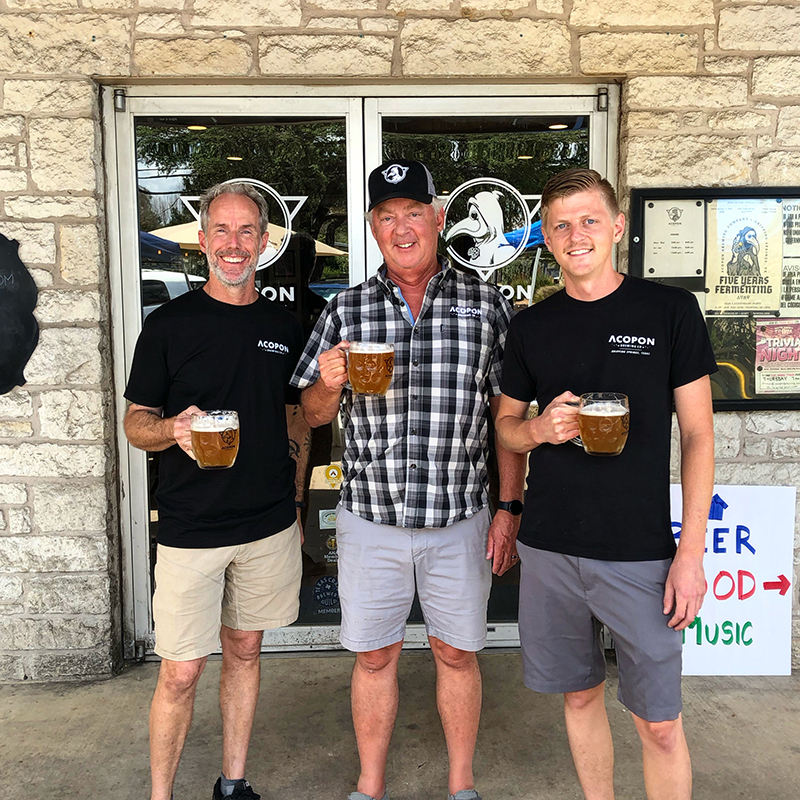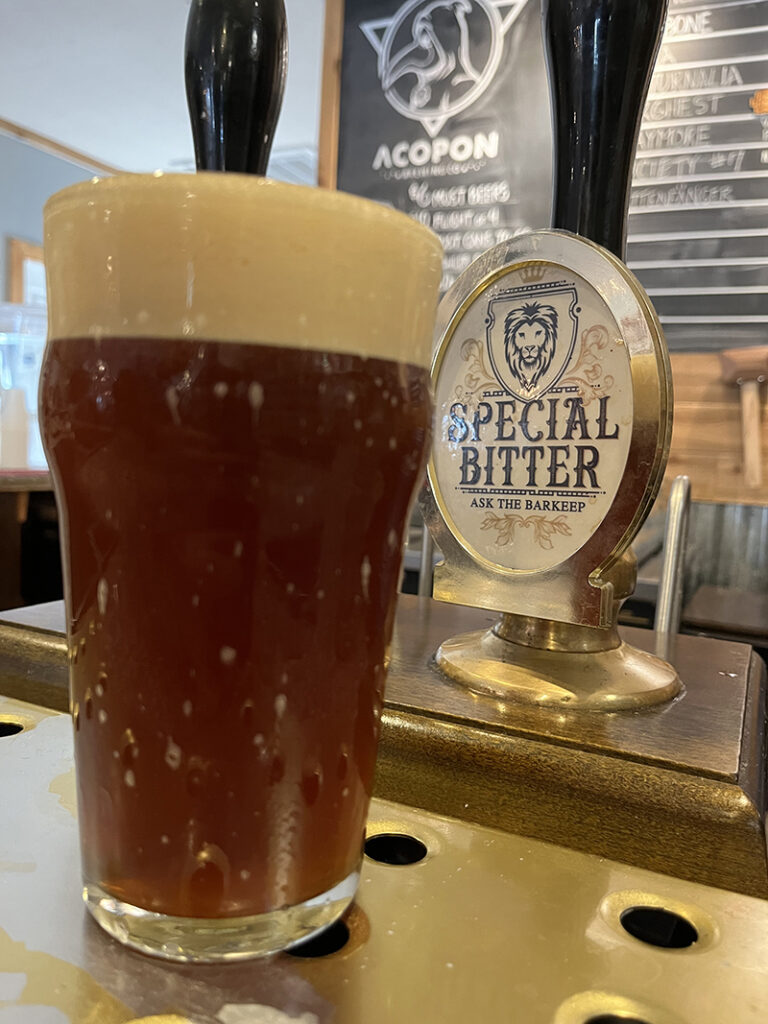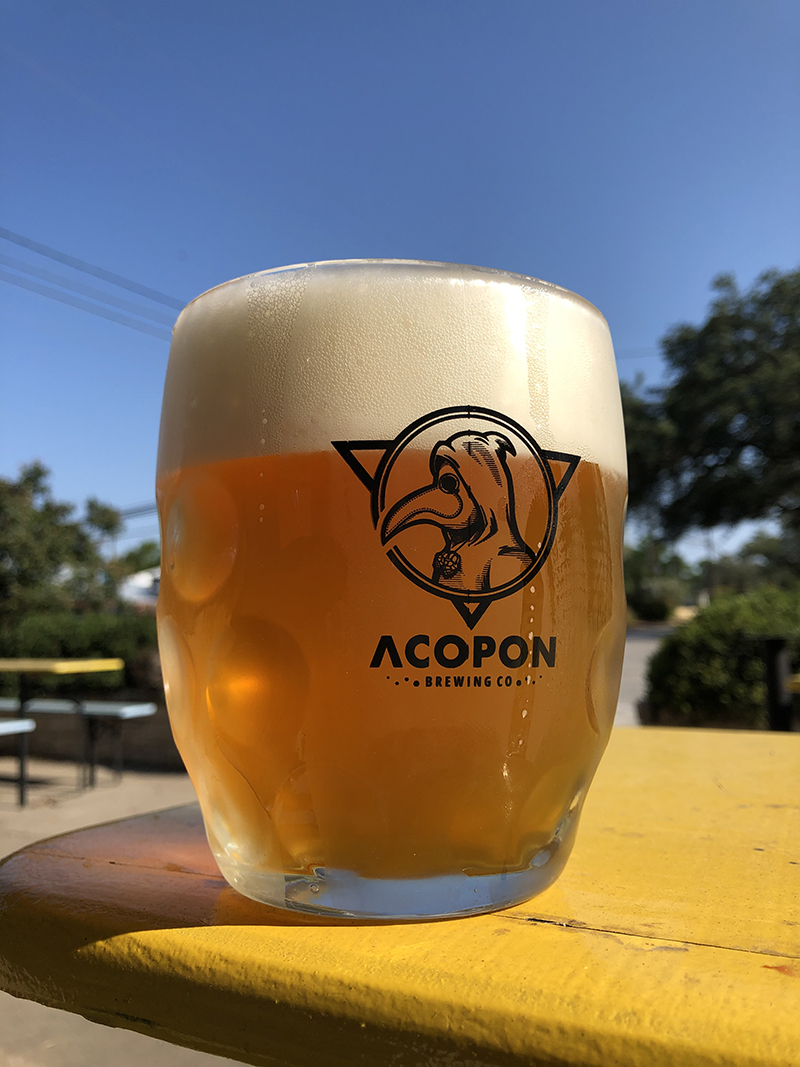Drive across the Hill Country, and it’s hard to miss the German-American heritage. Several communities bank heavily upon it, particularly Fredericksburg and New Braunfels. That extends to beer culture too.
But on Mercer Street in the heart of Dripping Springs, there’s a beer oasis with a different European feel. Take a few sips of the drafts at Acopon Brewing, and what you’ll get is very British. No, no one there speaks with a British accent, but the beer does. It’s the culmination of a vision borne by trips across the pond by owners David Niemeyer and John McIntosh.

“My business partner and I both spent time in the UK and we really fell in love with the pub culture there and cask beer in particular,” says Niemeyer, who is also head brewer. “Just spending time there around the UK and Ireland and Scotland and drinking cask beer in those pubs, and the community center feel of the pub itself.”
Those visits set in motion two visions for the pair. One, to bring that pub culture back home. Two, to bring back the beer styles unique to the British Isles and Ireland.
The culture came first. In the 2000s, the craft beer revolution was still developing and generally hadn’t made it out of America’s big cities. Frustrated at having to drive into Austin for a bar that specialized in quality brews, they bought a cool old building at 207 W. Mercer that had served many functions, including some time as a barber shop. And thus, The Barbershop Craft Beer and Wine Bar was born.
“We opened the Barbershop 12 years ago and the idea was to make it a community place where people could meet friends or make new friends.”
Mission accomplished, as Barbershop quickly developed a reputation as a great place to hang out and lift a pint of craft beer, especially Texas craft.
But they didn’t want to just sell beer, they wanted to make it.
“We did some brewing on a small scale there, but our plans were always to find another space for a brewery, whether building out back or someplace else.”
Someplace else ended up being just two doors down.
“Two or three years after the Barbershop opened, we acquired this building and opened the Mercantile, a wine bar that had tapas,” Niemeyer says, sitting in Acopon’s tap room. “We did that for a few years and realized we really wanted a brewery space and we had this building, so we said, ‘Why don’t we turn this into our brewery instead of putting it somewhere else?’ We opened [Acopon] here five and half years ago.”
They also wanted more than a craft brewery. They wanted something unique, both in feel and the style of beers, not just cranking out the same stuff as other American breweries.
American craft brewers tend to not be subtle, often pushing to see how far they can go with bold flavors — occasionally going a little too far. Niemeyer and McIntosh wanted the more easy-drinking, yet still flavorful, beers they had across the Atlantic.
“English beers were the foundation of American craft,” Niemeyer says. “It used to be that every homebrewer started off brewing English ales. Now, [U.S. brewers] Americanized them, made them hoppier and bigger, but that was the origin. That was where everyone learned to brew.”
And that’s where Niemeyer started too, but he hewed to the British origins — especially the use of cask brewing.
For the uninitiated, cask brewing involves fermenting the beer in a cask, allowing the carbonation to happen naturally. It’s the way beer was brewed for centuries before the advent of technology to force carbon dioxide into the beer mechanically.
It’s far more common in Britain. If you’ve hit a pub over there, you may recall having a beer that was pumped into the glass with something called an engine, rather than simply poured out of a tap. The carbonation was less intense, and it was served at a slightly warmer temperature than over here.
You’ll sometimes find cask in big city beer bars, but not regularly, and even more rarely in the Hill Country. It gave Acopon a niche, albeit one that may be unfamiliar to most.

“Our customers fall into two categories: locals and tourists. The beer tourists generally know what cask beer is. For people that don’t, we educate them about it.
“It’s not so fizzy. All the carbonation [of regular beers] kind of fills you up. The mouthfeel [of cask] is softer and allows more flavor to come through,” Neimeyer says.
“People have learned that drinking the beer a little warmer, you get more flavor. The temperature is cellar temperature. People think it’s room temperature, but it’s cooler than that.
“It’s been well received. We have three engines now, and the demand has been so strong we’re adding a fourth. Every cask lasts only two or three days.”
A big part of the appeal for Niemeyer is that the styles tend to be lower in alcohol than American craft. Acopon’s Homonculus is a style called mild and clocks in at a mere 3.5% alcohol by volume (ABV). And Gaspipes is a style called bitter (it’s not really bitter, it’s just called that because it has a little more hops than mild) and is only 3.9%.
“Low ABV also goes toward being community focused,” Niemeyer says. “It’s about hanging out for a while and socializing, not coming in and just slamming a couple of beers. I want people to have multiple beers. Those English styles lend themselves to that. It’s full-flavored beer, but you can drink three or four of them and make conversation.”
Acopon also has another niche: It’s in town.
The Hill Country has become famous for a particular style of brewery: Out in the countryside, rolling hills sprawling across a large plot of land, picnic tables under shady live oaks, and often a playscape for the kids.
But what if you don’t want to head out into the countryside? That involves a lot of time and effort, including getting someone to volunteer as the designated driver. Sometimes, you’d rather just stroll out the door and take an easy walk a few blocks down the street to the town pub for a pint.
“We’re not a ‘bring your kids and let them run around’ kind of place,” Niemeyer continues. “Those places are great, but we’re not that.”
But Acopon is a great place for adults to gather and have adult beverages.
“Historically, every town in Europe had their own little brewery and that was the only place you could get that particular beer,” he said. “We’re following that model.”


